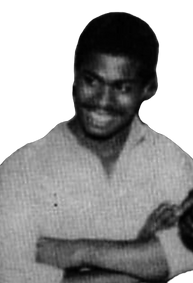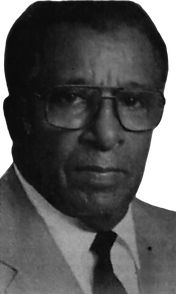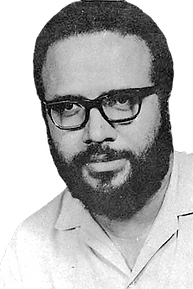










Interviews
Clement Dodd (Producer) When I first met Don Drummond up close in person, it was at Federal Records while I was doing my session around 1957. He came in for an audition as a vocalist during my session. What he had to sing wasn't really ready for commercial purposes, but I had heard that he had some musical talent. While being with him, I didn't realize that this was the same Don Drummond I had known and seen on stage at places like the Carib Theatre. After speaking with him, I realized who he was. He had been in Bellevue and was seeking some form of acceptance. So, I thought of giving him a trombone to see if he still had that sort of talent I had heard at the Carib Theatre earlier, maybe a couple of years before. I gave him the trombone and found out that he was in perfect musical condition. In fact, he seemed happiest playing his music with an instrument. I planned a session, and then we started playing mostly instrumentals. I got him to sign a contract for musical backing, solo works, and the whole works. That lasted for about six to nine months. At that time, he got unwell again and went back to Bellevue. He spent about nine to twelve months there. But on his return, he seemed to be in a normal condition. Don is a person who is more jolly when he is in the right mood. The things that he would do, you know, like hitting, but the things that he felt, you know, we thought of, because I've experienced a lot of that. Now, and Don's second return from the Bellevue, we thought of making an instrumental, and named this, this man, that man is back. (freely interpreted from Requiem for Don Drummond) His nickname “Don Cosmic” was coined by Clement Dodd. Dodd explained that Drummond had an abiding interest in space and the planets. “He didn’t talk much but he was interested in comets and planets and rocks from space that they call meteors. Sometimes when I talked to him about music he’d be talking about the planets and comets, so I start call him Don Cosmic and he liked it. That help get his attention.”

Prince Buster (Singer/Producer) The death of any man saddens me, and the death of Don Drummond surely saddens me. Don suffered a lot. Any man who contributes as much as Don did has to suffer. Don was at Alpha Boys School, where he found his life's path. From that stage, he tried to show people that a man from humble beginnings could achieve greatness. Don produced music that the greats around the world respect. Choosing the trombone, an instrument that most musicians are afraid even to touch, is a testament to his talent. The trombone is one of the hardest wind instruments to play, and Don produced such a superb sound with it. Living with Don, he was a quiet, peaceful man. What went wrong was just one of those things that happens when you are concentrating as hard as Don did. He couldn't stand anybody bothering him when he was concentrating because his concentration produced a sound that will live on forever, in Jamaica and all over the world. You all know the records of Don Drummond —he was a soul brother. (freely interpreted from Requiem for Don Drummond)

Tommy McCook (Musician) Don "The Man" Drummond, one of the greatest I have known through the years. A great guy... and like all the great guys, he had to die young. In my short association with Don Drummond, during the time of The Skatalites, I found him being withdrawn most of the time, from his colleagues and the public in general. But that's always the way of a great musician. Some people would say that he was antisocial, but he was always thinking about his work. As a jazz man, he is rated among the best in the world. As a technician, I think he is the best. His ideas are deep, most of them filled with sadness. I remember once we were listening to a Don Drummond production, and my wife always admired his playing. One day I asked her, "Why do you like his playing so much? What is it you see in his playing?" Her remark was that everything he does on his instrument is always filled with sadness, and it makes her heart go out to him. I think one of the main reasons for his achievements is that he has been sad most of his life. He has been ignored by society. But in my estimation, he made it... only a few have made it the way Don did. I know his name will live on forever. It has been a pleasure and a real joy working with the man. To you, Don, I say, keep up the good work. Wherever you are, and wherever you may go, we will always remember you as the greatest. (freely interpreted from A requiem for Don Drummond)

Johnny Moore (Musician) Don Drummond was a quiet and introspective schoolboy at Alpha. “He rarely talked and hardly ever laugh. Don always studied music by reading piano books. Whereas most trombone players would study, read and practice from a trombone book, Don always used piano books

Robin Small (Poem) Music like the "Reincarnation of Marcus Garvey" was not only entertaining but it was also educational. It insisted on our being attentive and it also made man maintain them folklore by being emotional. Listen to him in (the tune) "Don D Lion" come to agree ment with the trumpet of Johnny Moore. The unity that prevail in that music is something savoured like sweets. They maintain attention with their horns that made the drummer alert. Listen again, listen to "Treasure Isle" and you will hear how man can make instrument suggest travelling and motion and floating to man. Listen to the tune "Scandal" and you will hear a man suggest a certain (sense) of shock ... just by the way that him introduce the tune. You listen and you listen and you hear Lester Sterling's (alto saxophone) take over the music and introduce improvisation. And by the time Don Drummond('s trombone) is ready to speak again is like this said scandal but a reverse of Sterling's improvisation. (It) is just like the different versions of these stories that these same people always had when the scandal was about. In a different light also, slower, but behind vocalists backing up Dotty and Bunny on "Dearest," you hear (Drummond's trombone) submitting ... to the will of the vocalists and helping those vocalists to express what that tune "Dearest" was trying to say. Like a man dealing with him Dearest or vice-versa. The feeling was there and the willingness to express the extent and the boundaries of that said love to a man Dearest. Every tune, every piece of music, over five hundred of which, this man made, every piece of music Don Drummond (created) was like a theme for a very great movie or a very great Broadway show. Every one of them, like even "Street Corner" ... was an announcement of some sort. "Man in the Street," every one of these tunes sound like a very great theme song. And every one of them was. Don Drummond music have the effect of ganja. (from A requiem for Don Drummond)

Clancy Eccles (Singer) Clancy Eccles once told journalist Steve Barrow of the trombonist’s then fragile emotional state: “While we were recording down by Federal, they was digging out that piece of land, and Don used to go over and pick up this pretty piece of clay and put it in his Ovaltine. Don Drummond never eat anything hot – everything cold, lot of fruits and so on. One day Roland and Johnny looked in the bottle, it was clay and all those things mixed together, and Drummond said, ‘People are supposed to live in an atomic energy, you are supposed to build atoms inside of you’ – that’s why he ate the clay. For a madman, Drummond was extraordinary – I wouldn’t call Drummond mad. There’s another story of Don Drummond performing in Port Antonio, and the MC said, ‘Now we present Don Drummond!’ and Drummond just came right out, in a suit, and just pull down the zip and just piss on them! Drummond was just something else. Drummond never wear a shoe – always wear his felt hat, him look beautiful, but he’s not wearing a shoe. He was like one of those American jazz musicians, just a different type of person.

Fred Wilmot (Journalist) To talk about Don Drummond is to talk about one of the, I think, truly original and creative musicians that this island has produced. I never really was close to Don. I used to go to Burnmouth Club when he was playing with Tommy McCook to hear him, and also to watch him, because I think one of Don's real qualities was the fact that in addition to being very audible as a musician, he was very visible as a person. And the way he was as a visible person, I think, was part of the total effect of Don Drummond. He was a strange fellow. I think that he lived in a world which was a strange world, a world that made him perhaps supernormal rather than abnormal, and this was one of the qualities that was expressed in his music. He very, very frequently, when he was playing, had a kind of almost incoherence. Some of the music he played was definitely bad music as far as I was concerned, although I don't know what qualification particularly I have to say it. I felt that it was not particularly good music, but it was all part of this world that Don Drummond inhabited as a musician, a world that was full of strange shapes and strange sounds. He did bring something very original to Jamaican music, a great originality, a great talent, because he was a fine musician, a fine trombonist, a good arranger, a good man in the section, and I think the fact that he worked with Tommy McCook, who was another fine musician, was something that was both challenging to both of them and valuable to both of them. Tommy, who can be very, very brilliant in extemporization, offered the kind of challenge that Don Drummond needed periodically to bring him back into the world that was peopled by other people. He was tremendously introverted as a musician, and I think partly this incoherence that periodically can be heard in his music, if you listen to it objectively, was part of this escape mechanism of his, the runaway to the Don Drummond world, which society at least said was not the world of a normal man. (from RJR's A requiem for Don Drummond)

Jimmy Carnegie (Journalist) Though Drummond was a Jamaican and not within the mainstream of the Western European cultural tradition, his life and his death tended to follow the pattern of the English Romantic poets of the 19th century and latterly of the American jazz musicians of this century, with whom, of course, he had some direct relation. Drummond's work was not always consistent, both as a player and as a writer, but at its best he produced work I would consider of high musical order. Something like School in the Duke, which was popular some years ago, was a work in execution and in planning worthy of anyone, and this, though perhaps the best example, is not the only thing that you could get from Don Drummond. As a player, we have heard a lot of his writing without any factual evidence necessary to back this up, but anyone who has listened to jazz extensively will recognize that he was, at his best, an original trombone stylist with a great control of the lower register, and when he was coherent, he had technical control. There is also a pervading spirit of melancholy throughout much of his work, you find in many of the best artists. Life like Charlie Parker's in the United States came eventually to a conflict between creation and destruction, and it would appear when we consider how he ended his life, where he ended his life, at what age his life ended, that destruction went out in the end. But for a creative musician that took over a period of 20 years to produce what he did, when we get the stuff put down all on LPs or all on one coherent tape, again, it might be like Charlie Parker, not in the sense of one achievement as many lesser artists have put out, but fragments of greatness that I think really reflected the man and his comments on his society. Other people in this program have spoken and written about what Drummond has done, and I tend to support what many of them have said. It is a pity, I would say, that his potential, his real truth still was left unexpressed, but what we have shows really what people can achieve without a great deal of form and training, once they have the gift of expression. (from RJR's A requiem for Don Drummond)

Dermot Hussie (Musicologist and broadcaster) The creative man, in pursuit of his dream, lives in his own private world, distant perhaps, though never safe, too frail, too vulnerable. This was the world in which Don Drummond lived, but when he wished, he gave us vision, brilliant, bright and bold, but often blurred and sad. He walked a tightrope in the channels of his dream. At times he slipped, dogged by ill health. But we would wait, hope, as he regained a balance on the tightrope. Wait, hope, for more visions. It was this that was so painful about his life. The visions were never long enough. Fleet, fluid, fast things they were. Here now, a whisper tomorrow. As a musician, jazz, the music of the new world, flooded his veins. He owed an emotional allegiance to J.J. Johnson, but had his own way of expressing what he felt. Simple melodic lines with a sly mocking humor, a fine sense of harmony. It is a bitter irony that some of his finest music will not be a legacy for future musical heirs. Unrecorded dreams dropped at sessions, concerts, clubs. Few of us filed a phrase, a line, in our consciousness, feeling sure that the musician lives and plays forever. But not so with Don Drummond, for the pursuit of the dream also destroyed the pursuit. How true is the saying, if a man does not keep pace with his companions, perhaps he listens to the sound of a different drummer. Drummond truly listened to a different drummer. Let each man step to the music that he hears, whoever measured, or far away. (from RJR's A requiem for Don Drummond)



